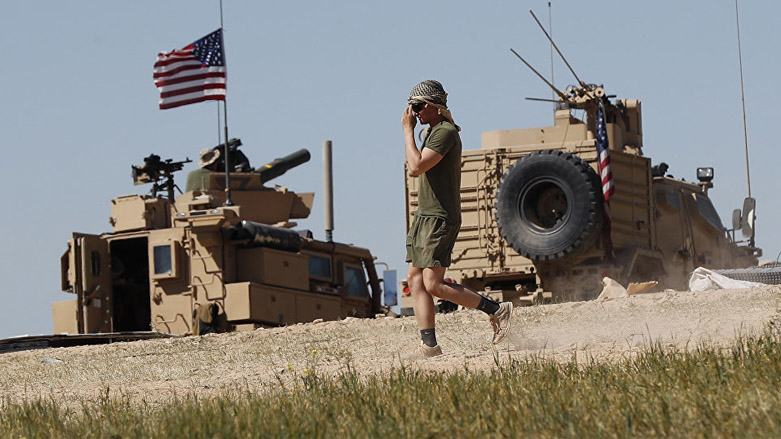State Dept reaffirms US commitment to careful Syrian withdrawal as doubts increase

WASHINGTON DC (Kurdistan 24) – “The United States is withdrawing its forces from Syria in a manner that is deliberate and coordinated,” State Department Deputy Spokesperson, Robert Palladino, said on Tuesday as he responded to a question from Kurdistan 24.
“We have no timelines to discuss at the current time,” Palladino continued, emphasizing, “the withdrawal of troops is a tactical change, but not a change in our mission.”
The basic question surrounding the US withdrawal is how can stability be maintained in the area of Syria, east of the Euphrates, where America’s main ally in the fight against the Islamic State there, the Syrian Democratic Forces (SDF), now maintain control.
One key objective is to prevent the reemergence of the Islamic State. Another is to prevent Turkey from attacking the SDF’s leading component, the Kurdish People’s Protection Units (YPG), which Ankara claims is a terrorist organization.
On Friday, US Secretary of State Mike Pompeo stopped in Iceland as he returned to the US from a conference in Poland on the Middle East. Speaking to the Icelandic National Broadcasting Service, Pompeo expressed a strong commitment to protecting Syria’s Kurds.
Asked why, after US forces withdraw, Turkish President Recep Tayyip Erdogan would show restraint towards Syria’s Kurds, Pompeo replied, “Because we’ve made clear that there’ll be a real price if he doesn’t.”
“President Trump made very clear his expectations with respect to how Turkey would treat those to his south inside of Syria,” Pompeo continued. “There will be a real cost associated with behavior in that way, and we are fully engaged diplomatically to deliver an outcome which protects the folks that are in Syria, as well as ensures that those people in Syria aren’t attacking Turkey.”
The most obvious solution to this problem is to establish a security zone along the Syrian-Turkish border, manned by an international force and supported by US airpower. Various figures, including senior US officials, have backed the concept, while the SDF itself has expressed support for such an arrangement.
However, when Kurdistan 24 asked Palladino about progress in this regard, he responded, “We are actively engaging with Turkey on this, and that is part of our efforts to ensure a safe withdrawal” from Syria. He provided no details about countries that might have offered to contribute to the international force.
Indeed, over the weekend, US Senator Lindsey Graham (R, South Carolina), led other US lawmakers attending the Munich Security Conference in a sharp confrontation with Acting US Secretary of Defense, Patrick Shanahan, on this question.
Shanahan, a long-time executive at Boeing, a major aircraft manufacturer and defense contractor, became Deputy Secretary of Defense in 2017. The Deputy Secretary of Defense typically manages the department. Thus, Shanahan was a successful private sector executive recruited to the Pentagon to direct a huge, cumbersome bureaucracy, and, perhaps, introduce some private sector efficiencies.
However, this situation changed radically, after Secretary of Defense Jim Mattis resigned in protest at President Donald Trump’s decision to withdraw abruptly from Syria. Mattis was prepared to stay in office until the end of February to enable the administration to find and name his replacement, but Trump had Mattis leave immediately. Thus, Shanahan, who has only limited experience in national security matters, became Acting Secretary of Defense on January 1.
At the Munich Security Conference, Sen. Graham sought to encourage other countries to provide forces for Syria, as the US withdrew. However, Shanahan undercut his efforts.
“Are you telling our allies that we are going to go down to zero [troops] by April 30?” Graham asked Shanahan in Munich in a meeting that included other US lawmakers, Washington Post columnist Josh Rogin reported early on Wednesday.
“Yes, that’s been our direction [from the president],” Shanahan replied.
“That’s the dumbest f—ing idea I’ve ever heard,” Graham responded—unusually strong language for an exchange between a US senator and a senior administration official.
Graham described all the negative things that could follow, including the re-emergence of the Islamic State and a Turkish attack on the Kurds.
“That could very well happen,” Shanahan responded.
Graham’s view—and what he had told European representatives in Germany—is that if they contributed hundreds of troops, the US could leave a few hundred of its own forces in Syria—not as Shanahan had told them, blindly following Trump’s orders, that all US troops would be out of Syria by the end of April.
Abdul Hamid al-Muhabash, co-chair of the Democratic Autonomous Administration (DAA), which runs the local administration on the ground in northeastern Syria, expressed views similar to Graham.
“Since the beginning, we have issued statements saying that the decision to withdraw is not rational” and “it does not come at the right time,” al-Muhabash told Kurdistan 24 on Wednesday.
“It should be coordinated with the self-administration,” he continued. “The only one who can benefit from this decision is ISIS.”
The Washington Post subsequently reported, late on Wednesday, that America’s “closest European allies” have “unanimously” refused to send their forces to Syria if the US pulls out entirely.
In business, the key issues are profit and loss. Business is about money. National security matters are different. They can involve matters of life and death, Paul Davis, a former Pentagon analyst and now a Senior Fellow at Soran University, advised Kurdistan 24.
Davis explained that he has serious doubts as to whether Trump and Shanahan, two businessmen, really understand what is at stake in Syria.
Editing by Nadia Riva
(Additional reporting by Wladimir van Wilgenburg)
